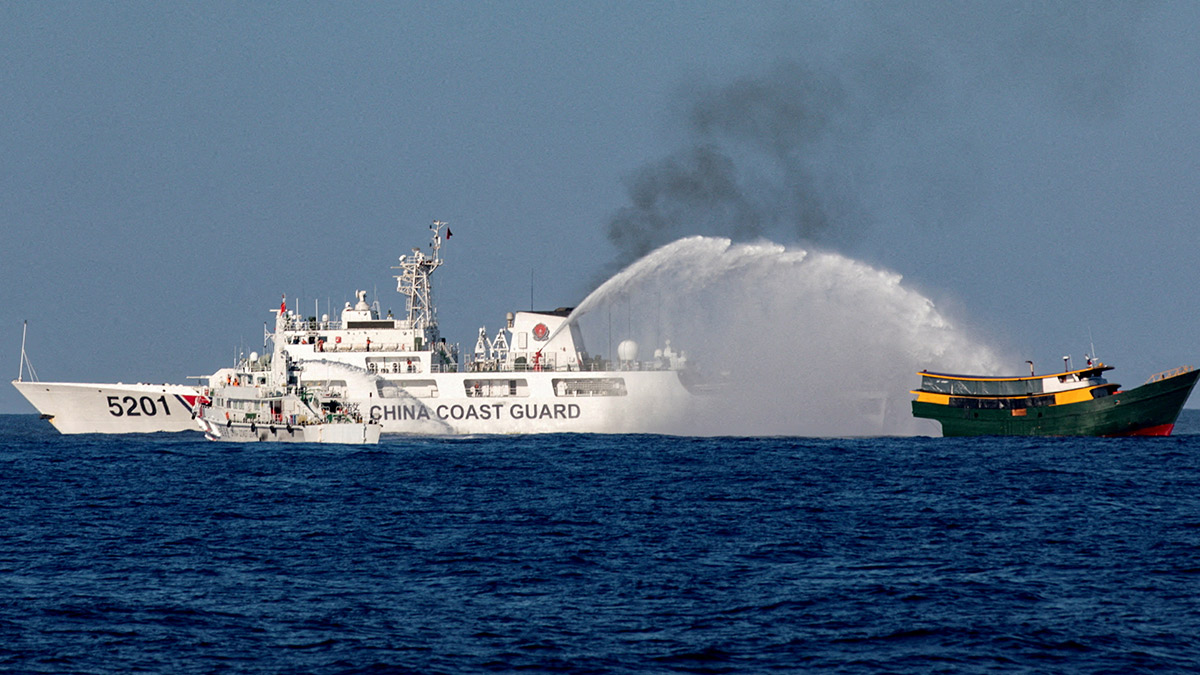
WATER BLAST A Chinese Coast Guard vessel fires its water cannon at the Philippine resupply vessel Unaizah May 4 on its way to a resupply mission at Ayungin (Second Thomas) Shoal in the West Philippine Sea in this photo taken on March 5. REUTERS
MANILA, Philippines — The Philippines would not be dragged into the ploy of heightening tensions in the West Philippine Sea by also resorting to the use of water cannons, President Ferdinand Marcos Jr. said on Monday.
The President rejected proposals for the Philippine Coast Guard (PCG) to mount water cannons on its vessels, even as he emphasized that the Philippines will not take China’s aggression in stride.
“We will not follow the Chinese Coast Guard and the Chinese vessels down that road because it’s simply… it is not the mission of our Navy, our Coast Guard to start or increase tensions,” he told reporters on the sidelines of the 2024 GOCC (Government-Owned and -Controlled Corporations) Day at the Philippine International Convention Center in Pasay City.
READ: China used ‘very fatal’ water cannon pressure in latest assault—PCG
“The last thing we would like is to raise the tensions in the West Philippine Sea. That’s the last thing. And that we’ll certainly [not do],” Marcos said.
The Philippines certainly has no intention to use water cannons as weapons, he emphasized.
“I would have to call them weapons because [these] had already caused damage,” Marcos said, referring to China’s water cannon attack on April 30, which damaged the railing and other parts of the main area of BRP Bagacay.
The PCG estimates the damage at P2 to P3 million.
“That’s why we’re not doing any of that [water cannon]. All we do is whenever our ships are blasted with water cannons, we send a démarche by sending notices to China and the other stakeholders,” the President said.
‘Moral high ground’
Sen. Jinggoy Estrada, chair of the Senate national defense committee, said Marcos’ decision “demonstrates his dedication to upholding stability, diplomacy and the long-term interests of our country.”
“Resorting to violence should never be a solution because we have already proven our ownership claims over the West Philippine Sea,” Estrada told reporters.
“Let us stand together in supporting our government’s principled approach. By following international norms and pursuing peaceful means, we can protect our maritime rights while avoiding unnecessary conflict,” he said.
Sen. Francis Tolentino described Marcos’ decision as “pragmatic and responsible,” as it would help “maintain the current moral high ground of the Philippines” in its maritime row with China.
But Senate Minority Leader Aquilino Pimentel III expressed doubt that the President’s position would help ease tensions with Beijing.
“So why are other ‘powers’ being brought in to involve themselves in the West Philippine Sea if the ‘intention’ is to lower tensions?” he said in a Viber message.
Duterte’s agreement
“Why increase the number of Edca sites?” he asked, referring to the Philippines’ Enhanced Defense Cooperation Agreement with the United States. “Why buy missiles and submarines instead of surface vessels which can obviously be used in disaster relief operations?”
Sen. Risa Hontiveros, in a privilege speech on Monday, again raised the need to look into the “gentleman’s agreement” that former President Rodrigo Duterte had entered into with China.
Duterte himself had earlier confirmed that he had agreed to leave unrepaired the BRP Sierra Madre, the decrepit World War II-era ship that serves as a Philippine military outpost at Ayungin (Second Thomas) Shoal.
While she acknowledged that Beijing raised the gentleman’s agreement as part of its “smoke and mirrors” tactic, Hontiveros said government officials who willingly gave up the country’s sovereignty over the West Philippine Sea should still be held liable.
She said Duterte’s arrangement with China would have “implications moving forward” on the Philippines’ efforts to protect its territory.
“In this information warfare that China wields to her advantage, it becomes even more crucial that we get to the truth,” Hontiveros told her colleagues.
“If something has been concealed from the Filipino people, let us bring it to light. If the Chinese government is lying through its teeth, let us expose those lies,” she said.
Truth, she reiterated, was the country’s best weapon to counter China’s baseless claims over the West Philippine Sea.
“The series of [water cannon] attacks only shows that the Chinese government appears committed to achieving through the unlawful use of force what it cannot achieve by international law,” Hontiveros said.
“When it comes to the West Philippine Sea, when it comes to matters of national sovereignty, we must unite as one people. However, we cannot have genuine unity without accountability,” she added.


